New Report Tracks Sources of Marine Litter
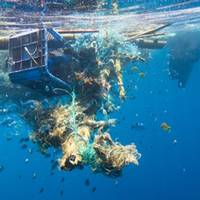
The sources and impact of sea-based marine litter form the focus of a new report by the Group of Experts on the Scientific Aspects of Marine Environmental Protection (GESAMP), an advisory body to the United Nations sponsored by 10 UN entities. The report outlines the various sources of marine litter and the impact and assesses the current availability of data and identifies knowledge gaps for the main categories of sea-based sources of marine plastic litter. The Working Group was established by GESAMP…
IMO-led Meeting Addresses Dumping at Sea
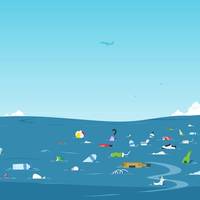
Preventing pollution from dumping of wastes at sea relies on global frameworks, regional conventions and protocols and national regulations, the UN's shipping agency, the International Maritime Organization (IMO) said. To be effective, these need to be aligned and implemented effectively. This was the subject of a March 2 meeting organized by IMO's Office of the London Protocol and Ocean Affairs (OLCP&OA) and UNEP/MAP.The meeting was attended by Barcelona Convention Contracting Parties…
IMO Updates Virtual Meetings Calendar
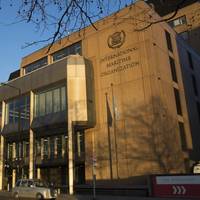
The International Maritime Organization (IMO) has published its remote meetings calendar for the rest of 2020 after its initial agenda of IMO Council and Committees sessions was scrapped due to the coronavirus pandemic.The first scheduled meeting is set to be a simultaneous, remote extraordinary sessions of all Committees (expected to be held 16-18 September), to address procedural matters. This follows decisions of the IMO Council's thirty second extraordinary session (summary here C.ES 32)…
IMO Postpones Meetings Due to COVID-19
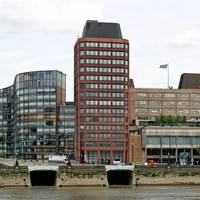
The International Maritime Organization (IMO) has postponed a number of meetings following the global coronavirus outbreak.London-headquartered IMO said the move takes into account the decision of the UK on March 5 to move toward the "delay" phase of its coronavirus action plan: a guide to what you can expect across the UK, similar actions adopted by other UN agencies, and the increased difficulties for delegates from IMO Member States traveling from abroad to attend IMO meetings.Specifically…
Carbon Capture and Storage Under Seabed
Carbon capture and storage under the seabed is recognized as one tool in climate change mitigation. An International Maritime Organization (IMO) treaty, the London Protocol, provides the basis in international environmental law to allow CO2 storage.This week, a proposal to agree the early application of an amendment to allow sub-seabed geological formations for sequestration projects to be shared across national boundaries will be put before Parties to the London Protocol (LP) and its forerunner, the London Convention (LC).It would remove a barrier for countries which wish to make use of carbon capture and storage - but which do not have ready access to offshore storage sites within their national boundaries.
South Asia Fights Marine Pollution
The benefits and implications of acceding to the 1996 London Protocol on the prevention of marine pollution by dumping of wastes and other matter in the South Asian Seas Region were discussed at a regional workshop in Dhaka, Bangladesh (10-11 July).According to a note from the International Maritime Organization (IMO), the main objectives of the workshops were to inform relevant authorities of the benefits and implications of ratifying, implementing and enforcing the London Protocol.The purpose of the London Convention is to control all sources of marine pollution and prevent pollution of the sea through the regulation of dumping into the sea of waste materials.
IMO's Ghost Gear Initiative
International Maritime Organization (IMO) is working on best practices to prevent and reduce abandoned, lost or otherwise discarded fishing gear."Abandoned, lost or otherwise discarded fishing gear can continue to capture and kill marine animals and may cause navigational hazards – as well as contributing to the global marine litter problem," the UN body pointed out.IMO is working closely with the Food and Agriculture Organization (FAO) on reducing marine plastic litter from fishing vessels, including fishing gear, as part of the IMO Action Plan on the Reduction of Marine Plastic Litter. This collaboration includes IMO participation at a series of regional FAO-led workshops on best practices to prevent and reduce abandoned…
Algeria to Protect Marine Environment
International Maritime Organization (IMO) training on the international treaty covering waste dumping at sea, the London Protocol, is underway for Algerian government officials and participants from shipping companies and port authorities.The workshop, held in Alger (9-10 April), is enabling cooperation between different sectors – allowing effective implementation of measures aimed at protecting the marine environment from dumping of harmful wastes at sea.As set out in the London Protocol and the Dumping Protocol of the Barcelona Convention – the regional convention for the protection of the Mediterranean Sea established under UN Environment’s Regional Seas Programme.Participants examined ways of effectively assessing the environmental impact of dumping of certain substances…
Impact of Space Debris on Marine Environment
Material jettisoned during space vehicle launches could impact on the marine environment. This is one of a number of emerging issues being discussed by Parties to the treaties which regulate the dumping of wastes at sea.The Scientific Group of the London Convention and London Protocol is reporting on its ongoing assessment of the issue of space debris to the annual meeting of the Parties (5-9 November). London Convention is one of the first global conventions to protect the marine environment from human activities and has been in force since 1975.The meeting is also looking at the disposal of fibre-reinforced plastic (FRP) vessels, since a large number of abandoned or no-longer usable FRP vessels - including fishing vessels and leisure craft - are dumped at sea each year…
Angola Protects Marine Environment
A national workshop on the treaty covering dumping of wastes at sea, the London Protocol, is being held in Luanda, Angola (30-31 May). The workshop is raising awareness among stakeholders on the practical aspects of effective implementation of the London Protocol to protect the marine environment from the dumping of harmful wastes at sea. With more light being shed on the dramatic impact of marine litter on coastal areas, this workshop is yet another example of how International Maritime Organization (IMO) is tackling this problem. Angola ratified the London Protocol in 2006 and this workshop is bringing a special focus on the actions to be taken at the national level to fully implement all its provisions.
Keeping the Red Sea Clean
In continuing its work to keep the oceans clean, International Maritime Organization (IMO) encourages member countries to ratify and enforce the London Protocol to prohibit dumping at sea. As part of such efforts, a seminar was held in Djibouti City, Djibouti (11-13 December) on implementing the London Protocol. The workshop introduced participants from Djibouti and Somalia to the benefits of protecting the marine environment of the Red Sea from pollution of dumping of wastes and other matter at sea. Among the countries surrounding the Red Sea, only Egypt, Saudi Arabia and Yemen are Parties to the London Protocol. Increasing the number of contracting Parties to the Protocol is an important part of the Strategic Plan for the London Protocol and London Convention.
Ocean Change Requires Solutions: UN
Solutions to address human-induced “Ocean Change” are needed to save life in the ocean and reverse the cycle of decline in which it is caught, according to Fiji's Ambassador Peter Thomson, the UN Secretary General's Special Envoy for the Ocean. Peter Thomson, who was visiting the International Maritime Organization (IMO) in London, said that as a Fijian, he had personally witnessed the degradation of the marine environment in his lifetime, citing marine litter and coral bleaching as just two examples. “As a grandfather I find these changes tragic. It is time for us to implement the solutions to ocean's many problems,” he said. Special Envoy Thomson told a briefing of IMO senior staff that the UN Ocean Conference…
Jordan Workshop Focuses on Dumping of Wastes at Sea
Regulations covering the dumping of wastes at sea are the focus of a national workshop in Aqaba, Jordan (28-30 November). The event is raising awareness of the London Protocol, which entered into force ten years ago and modernized the original London Convention dumping treaty (ratified by Jordan). Under the Protocol, all dumping at sea is prohibited - with the exception of wastes commonly agreed by Governments and then put on an approved list. Thirty participants from various maritime-related institutions, academia and navy are taking part in the workshop, which is the first of its kind held in the country. It was opened by H.E. Salah Abu Afifeh…
Madagascar Workshop Promotes Dumping of Wastes at Sea Regulations
A national workshop promoting the treaty covering dumping of wastes at sea, the London Protocol, was held in Antananarivo, Madagascar (11-12 August). The workshop, the first of its kind held in the country, is raising awareness of the regulatory framework provided by the Protocol. It is thereby supporting Madagascar in protecting its marine environment from the dumping of wastes and other matter at sea. The London Protocol, which this year commemorates its twentieth anniversary, has 47 contracting States to-date and is the subject of increasing interest among many countries in Africa and Asia. The event is hosted by the Ports, Maritime and Rivers Agency of Madagascar (APMF) with support from Environment and Climate Change Canada.
UK First to Accept Marine Geoengineering Amendments
The United Kingdom has become the first State to formally accept the 2013 marine geoengineering amendments to the 1996 “London Protocol”, the treaty covering dumping of wastes at sea. The amendments support the precautionary approach by providing for specific marine geoengineering activities to be permitted only when the activity is assessed as constituting legitimate scientific research. Currently, only ocean fertilization for research purposes may be permitted. Meanwhile, the marine scientific expert group GESAMP is currently undertaking a comprehensive study on marine geoengineering to better understand the potential impacts of proposed marine geoengineering techniques on the marine environment – including social and economic consequences.
UK First to Accept Marine Geoengineering Amendments
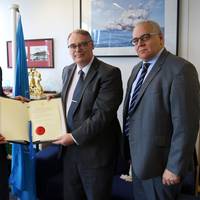
The United Kingdom has become the first state to formally accept the 2013 marine geoengineering amendments to the 1996 “London Protocol”, the treaty covering dumping of wastes at sea. The amendments support the precautionary approach by providing for specific marine geoengineering activities to be permitted only when the activity is assessed as constituting legitimate scientific research. Currently, only ocean fertilization for research purposes may be permitted. Meanwhile, the…
Decade Old Waste Dumping Treaty
The 1996 "London Protocol" covering the dumping of wastes at sea entered into force ten years ago today (24th March). The Protocol modernized the original “London Convention” dumping treaty, bringing in a so-called “precautionary approach” that heralded a new era of prohibition of all dumping at sea with the exception of wastes commonly agreed by Governments and then put on an approved list. Find out more in our information leaflet. Notably, those party to the Protocol adopted amendments in 2006 and 2009 to allow carbon storage and capture in some seabed geological formations – with the aim of mitigating the impacts of increasing concentrations…
Meeting Addresses Black Sea Ship Pollution
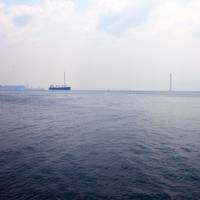
The Commission for the Protection of the Black Sea against Pollution – an International Maritime Organization (IMO) observer and implementing partner for capacity-building activities in the Black Sea – held its 31st Regular Meeting of Commissioners in Istanbul, Turkey, October 8. The IMO and the Black Sea Commission collaboration has encompassed various workshops and training courses at both national and regional levels to develop capacity for the implementation of several IMO instruments aimed at protecting the marine environment from adverse effects of shipping.
Marine Geo-engineering to be Regulated
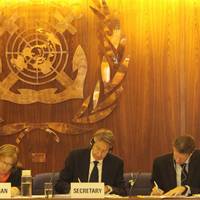
Marine geo-engineering, including ocean fertilization, will be regulated under amendments to the 1996 Protocol to the international treaty which regulates the dumping of wastes and other matter at sea. The amendments, adopted recently by Parties to the 1996 Protocol to the Convention on the Prevention of Marine Pollution by Dumping of Wastes and Other Matter, 1972, add a new article 6bis which states that “Contracting Parties shall not allow the placement of matter into the sea from vessels…
Sea Fertilization Objection by IMO Convention Signatories
Parties to international dumping treaties express concern about reported offshore iron fertilization by salmon fishing industry. Parties to the international treaties which regulate the dumping of wastes and other matter at sea have issued a statement of concern regarding the deliberate ocean fertilization activity that was recently reported to have been carried out in July of 2012 in waters off the west coast of Canada. The Contracting Parties to the Convention on the Prevention of Marine Pollution by Dumping of Wastes and Other Matter, 1972 (London Convention) and to the 1996 Protocol thereto (London Protocol), meeting in London from 29 October to 2 November 2012…
IMO's 'London Convention' Celebrates Anniversary
Key international marine environment protection convention celebrates 40 years of progress. The use of the world’s oceans as a dumping ground for harmful wastes has been systematically regulated and reduced under the terms of an international convention that, this year, celebrates 40 years since it was first adopted. The "Convention on the Prevention of Marine Pollution by Dumping of Wastes and Other Matter, 1972", usually referred to as the "London Convention", was one of the first global conventions designed to protect the marine environment from human activities. It has been in force since 1975. The objective of the London Convention…





